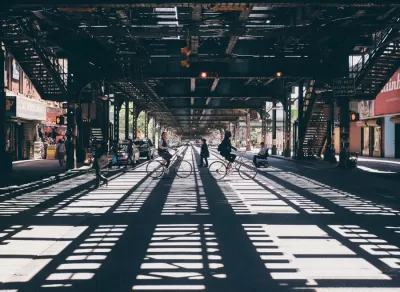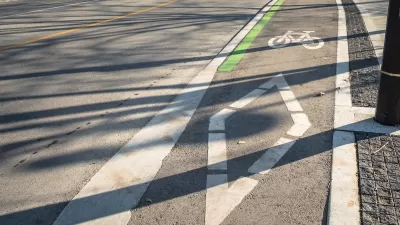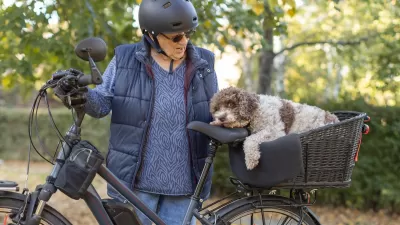Those in search of high-tech solutions for urban congestion and pollution often overlook the bicycle as a powerful, if simple, tool for reducing both and improving urban transportation.

Writing in Next City, Nicolas Collignon argues that it isn’t autonomous or electric vehicles that can change the future of transportation, but rather a much simpler technology: the bicycle. “Sparked by the pandemic, supported by people waking up to the climate crisis and now fuelled by the rising price of oil, we’re living through a bicycle renaissance,” Collignon writes.
Yet a “gap between our imagined future, the promises of techno-kings and the realities of progress” persists. To Collignon, this is in part due to the exciting future visions promised by technologists. But every flying car or delivery robot comes with its own massive set of implications for infrastructure and society. “When we begin to see technology through the lens of systems, it becomes clear that genuine technology-led progress will focus on dealing with the accelerating complexity of today’s world, not increasing the complexity of our tools.”
When it comes to bicycles, Collignon points out that while they are often more efficient and nimble, their very speed and flexibility prevent them from being easily quantified and “optimized” by algorithms. We don’t need to revolutionize the bicycle, “the fastest, most energy efficient, resilient, and lowest carbon emitting urban vehicle,” Collignon writes, but rather change the lens through which we view and organize urban mobility flows.
FULL STORY: Bikes, Not Self Driving Cars, Are The Technological Gateway To Urban Progress

Maui's Vacation Rental Debate Turns Ugly
Verbal attacks, misinformation campaigns and fistfights plague a high-stakes debate to convert thousands of vacation rentals into long-term housing.

Planetizen Federal Action Tracker
A weekly monitor of how Trump’s orders and actions are impacting planners and planning in America.

In Urban Planning, AI Prompting Could be the New Design Thinking
Creativity has long been key to great urban design. What if we see AI as our new creative partner?

Cal Fire Chatbot Fails to Answer Basic Questions
An AI chatbot designed to provide information about wildfires can’t answer questions about evacuation orders, among other problems.

What Happens if Trump Kills Section 8?
The Trump admin aims to slash federal rental aid by nearly half and shift distribution to states. Experts warn this could spike homelessness and destabilize communities nationwide.

Sean Duffy Targets Rainbow Crosswalks in Road Safety Efforts
Despite evidence that colorful crosswalks actually improve intersection safety — and the lack of almost any crosswalks at all on the nation’s most dangerous arterial roads — U.S. Transportation Secretary Duffy is calling on states to remove them.
Urban Design for Planners 1: Software Tools
This six-course series explores essential urban design concepts using open source software and equips planners with the tools they need to participate fully in the urban design process.
Planning for Universal Design
Learn the tools for implementing Universal Design in planning regulations.
Appalachian Highlands Housing Partners
Gallatin County Department of Planning & Community Development
Heyer Gruel & Associates PA
Mpact (founded as Rail~Volution)
City of Camden Redevelopment Agency
City of Astoria
City of Portland
City of Laramie





























